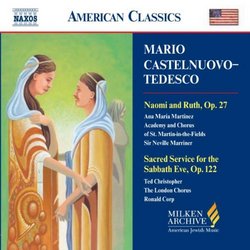A little bland.
Steve Schwartz | New Orleans, LA USA | 02/05/2004
(3 out of 5 stars)
"Castelnuovo-Tedesco, best-known probably for his 1939 guitar concerto, wrote music that I don't believe can be called strongly memorable. It's expertly written, at times even beautiful, but it seems to disappear as soon as it's over. Furthermore, he never seemed to find himself, or at least to establish a strong artistic personality. At his best, he resorts to a neoclassic idiom. Most of the time, the music, despite its occasional prettiness, doesn't sound like much of anything. The works here the composer wrote near or at the top of his game. Naomi and Ruth, a little cantata, tells the familiar story, with the soprano soloist taking the part of Naomi and the chorus taking over the narration and the words of Ruth. It's an almost archetypal example of the composer's unevenness, in that the music for the chorus is much stronger than that for the soprano. The Sacred Service has its moments, but large stretches of it simply go by. My favorite parts of the CD were the excerpts from the organ preludes, Prayers My Grandfather Wrote, and especially from the Memorial Service for the Departed. Here, whatever engagement the composer had with his inspiration manages to cross over to the listener.The performances are mostly top-drawer, with Neville Marriner leading an outstanding Naomi and Ruth. The choir and orchestra knock you out with their precision and tone. By comparison, Ronald Corp's Sacred Service sounds muddy, and the baritone soloist, Ted Christopher, suffers from what sounds like occasional vocal tiredness. Organist Barbara Harbach gives an intense account of the Prayers, and canto Simon Spiro (though of modest voice) nevertheless sings beautifully and with wonderful communication in the Memorial Service. Indeed, the composer gets such strong performances, it may be difficult to separate one's pleasure in the singers and players from the pleasure in the work."
A lovely Friday night service and a moving story of Ruth
David M. Zajic | Columbia, MD USA | 01/27/2004
(5 out of 5 stars)
"The major work is the Sacred Service for Sabbath Eve. It seems that this work was intended to be performed in a Reform or Conservative synagogue as a Friday night service. Complete Jewish service settings are rare. Few synagogues today would care to use this work as a service: Reform and Conservative congregations generally value participatory services and congregational singing, while Orthodox congregations do not use organ or mixed choirs (among other reasons). There is also a general trend away from communal Friday evening services in the U.S. (unfortunate, IMHO). The details of Jewish services and liturgy are very complex, varying with the season of the year, the branch of Judaism, Ashkenazik vs. Sephardic, and local tradition. These variations make it difficult to compose a large scale work that will be generally compatible with ritual worship. Happily there is a home for such works (also including the Milhaud and Bloch sacred services) on record, and (hopefully more often as a result of the Milken project) in concert.
Orthodox listeners should be warned that in this recording Hashem's names are pronounced as in prayer.
The mood is generally one of reverent awe, with the exceptions of the Mi Chamocha and the Kiddush, which are exuberently joyful. If you are a regular attendee at Friday night services you will enjoy hearing the familiar words in a skillfully arranged and heartfelt musical context.
The short cantata Naomi and Ruth tells the story, in English, of how Ruth came to adopt the faith of her mother-in-law, Naomi. It is generally for two-part women's chorus with a soloist in the role of Naomi. The choral writing is polyphonic, but allows the words to be clearly understood. The music is melodic and emotionally engaging, flowing with the natural cadences of English. The orchestration is exquisite. (Note the use of dry trumpets accenting the word famine, and the deaths of the husbands.) Ravkein's objection that the crucial words "my god" are missing is a typo in the booklet text; the words do appear in the cantata.
The selections from Memorial Service are pleasant, and Mr. Spiro sings them beautifully and delicately.
The essays in the booklet are outstanding. The tracking information and performer credits, the absence of which Ravkein noted, are on the back of the jewel box."


 Track Listings (22) - Disc #1
Track Listings (22) - Disc #1